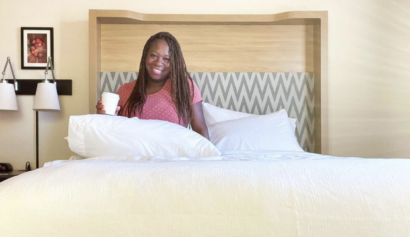At Atlanta Black Star, we are spending this entire week celebrating, honoring, exploring and uplifting Black Fatherhood by examining it through the lens of 7 themes: Lead, Build, Provide, Care, Protect, Work and Love. This is the third story in the series, looking at all the ways—often beyond money—that black fathers uplift their families by being providers.
Black men are more than providers of food, clothing and shelter for their families. They have, for decades, been role models for their immediate families and the black community in general. What they often provide is a vision of strength, perseverance and pride.
On the fireplace mantle in the home of Mary Miller sits the picture of Andrew Jackson. Not the seventh President of the United States, but grandfather to the Miller children, Mary, Ron, Shirley and Beverly. Grandpa Jackson’s picture is the largest picture on the mantle, and appropriately so. A small man of stature, he was larger than life. He was a teacher, preacher, single parent, and inventor of two patented items: eyeglasses for cockfights, and a device to keep tractors in a straight line for plowing fields. Born in the 19th Century, some years after the emancipation, Grandpa Jackson was a stern disciplinarian who gave and demanded respect. He lived proudly and fearlessly in the Jim Crow south—emphasis on living fearlessly and Jim Crow south. Grandpa Jackson was the grandfather of my husband, Ron Miller.
The stories that stood out about Grandpa Jackson were not his inventions, per se, but how he lived and how he was an example for the community. It was not uncommon for Grandpa Jackson to direct white delivery and service people to the back door to mirror blacks who were forced to do the same in his lifetime. Grandpa Jackson was a “helluva” man.
Like Grandpa Jackson, there are thousands of stories of good black men that recycle through the black community. Only a few make it to mainstream, but not nearly enough to break the misperceptions and stereotypes.
Ever heard of Phil Jackson? No, not the Lakers coach, but the head of The Black Star Project. He founded the Chicago-based organization in 1996, and has since been relentless about eliminating the academic achievement gap between white students and black and Latino students locally and nationally.
What about Tim King, founder and CEO of Urban Prep Academies, a non-profit organization operating a network of public college-prep boys’ schools in Chicago—most of them predominantly African American—including the nation’s first all male charter high school?
Our Father, Our Heroes:
And then there are the guys in our neighborhoods who are great fathers, terrific husbands, and stellar businessmen like Al Grimes, Atty. Greg Wilson, Ronald Miller, Rev. Otis Moss III, Willie Calhoun, Brad Sanders, Brandon Miller, Andrew Honeywood, Alvin Alassane Jackson, Ananiais Grainger, Will Abernathy, Mike Ferguson, Craig Gilmore, Neil Nelson, and Jeff Wright—good men, different ages, from different walks of life. Yet their goodness is overshadowed by a plethora of mainstream stories and dreadful news clips about the horrible deeds and plight of black men that many casual observers—even in the black community—are able to form stereotypes that lump all black men together.
Black men are also present in the black community in positive ways:
• Since 1990, Real Men Cook’s nationally recognized Father’s Day event has seen hundreds of men participating each and every year. The event attracts thousands in over 15 cities who enjoy sampling their favorite dishes that the men have volunteered to prepare. Over the years, several men continue to involve themselves and their entire families to share in this amazing love fest of men motivating and inspiring other men. [i]
• Real Fathers, Real Men: For the past 10 years, syndicated radio host Tom Joyner has presented real, positive, authentic stories about black fathers. He honors one every week during a special segment on his popular syndicated Tom Joyner Morning Show, which runs daily in over 150 markets.
• 100 Black Men of America: Dating its beginnings back to 1963, this group has been mentoring and creating programs designed to improve conditions in the black community. With 116 chapters and over 10,000 members, it has been a positive presence in the black community for decades.
• Churches, Civil Rights organizations, fraternities and others have always had a strong presence in the black community, addressing a variety of issues and conditions. It was the Alpha Phi Alpha fraternity that raised $112 million and led a public campaign to justify the Martin Luther King Memorial on the National Mall.
Let’s not forget the countless fathers, barbers, doctors, lawyers, teachers, coaches and others who have always been present in the black community.
Role models.
It’s time to take a deeper look at black men, and celebrate who they really are.
Pepper Miller is the President of The Hunter-Miller Group, Inc., a leading edge market research and strategic planning firm, and co-author of “What’s Black About It?” and author of “Black STILL Matters in Marketing.”

